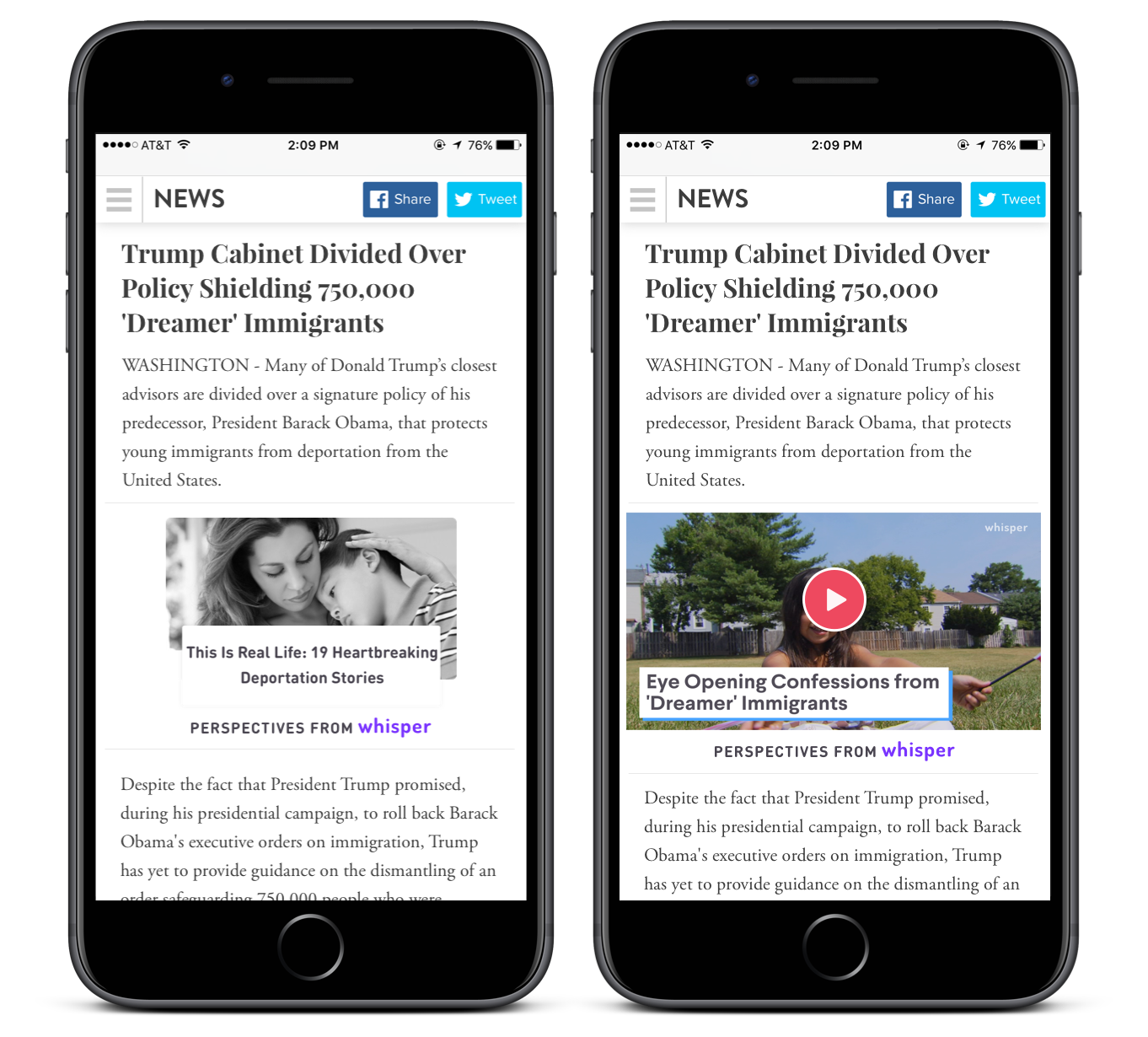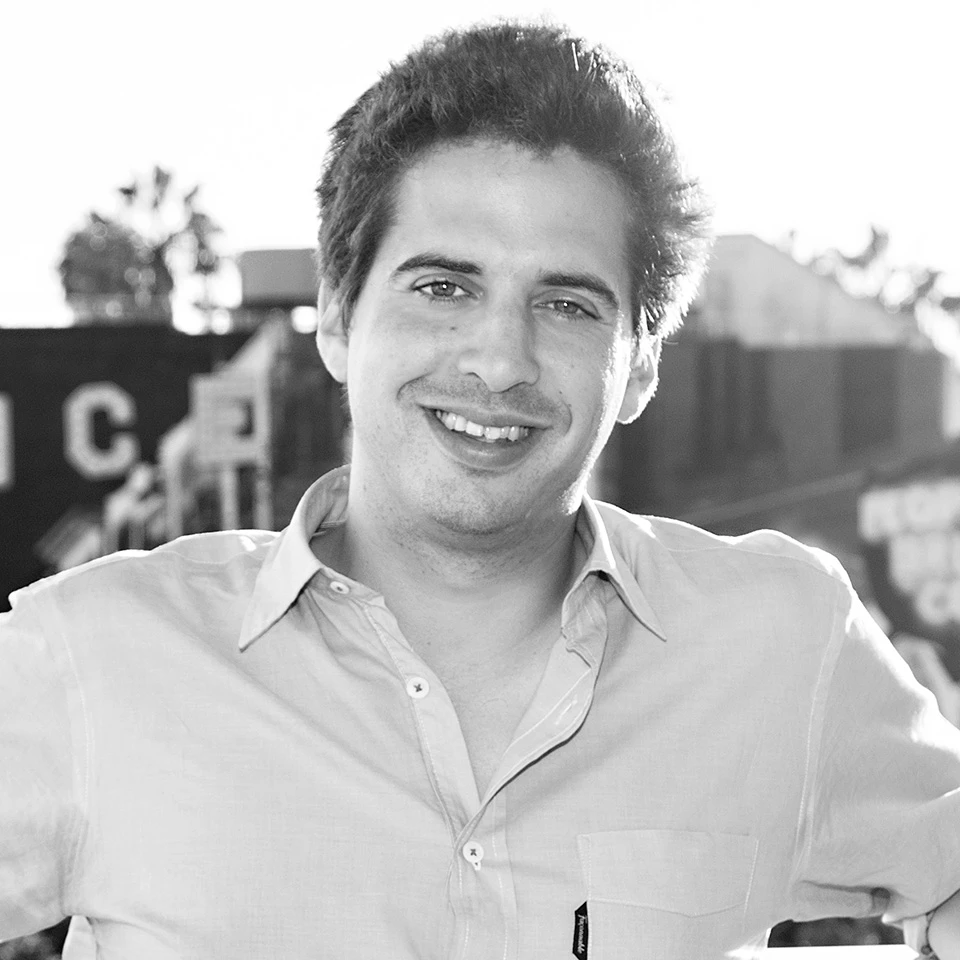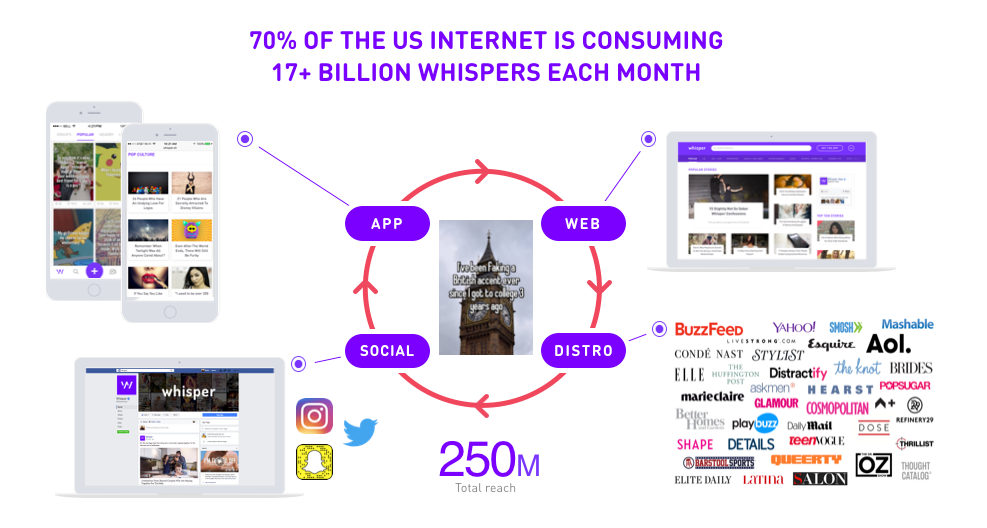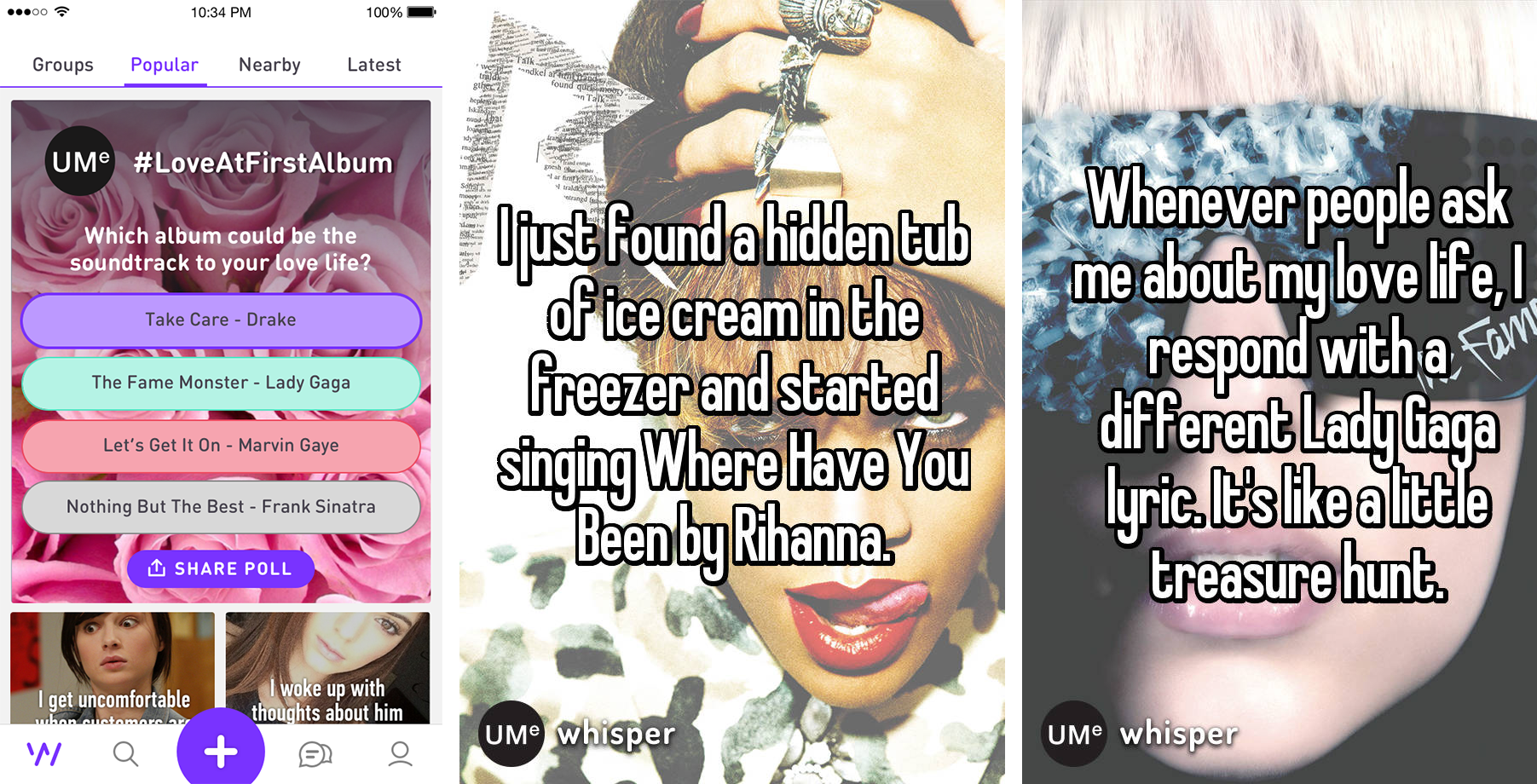The last few years have been tough for anonymous social networks. Yik Yak, the popular collegiate bulletin board once valued at $400 million, recently sold its engineering team to Square for less than $3 million and shut down. Confessional site Secret went belly-up in 2015. But Whisper, a Los Angeles-based company backed by approximately $70 million in venture capital, is soldiering on.
Whisper’s multipronged survival strategy includes innovative content partnerships, investment in AI, aggressive content moderation, and multiple monetization schemes.
The young-skewing app (75% of users are 18-34) boasts approximately 30 million active monthly users on their mobile app and website who come to discuss and post—anonymously—about everything from painful personal struggles to bad boyfriends, politics, and PMS.
The privately owned company keeps its financials close to the vest but says its ads garner a billion impressions monthly and that it has inked immersive advertising deals with partners like Disney/Pixar, Coca-Cola, and Netflix.
Related: Get Inside Whisper’s Secret Economy
Different clients do different things: Coca-Cola, for instance, sponsored an ad asking users to anonymously suggest ways to combat cyberbullying, while Disney/Pixar paid to have stills from The Good Dinosaur offered up as image backgrounds for posts.
Whisper is also experimenting with new content tools: Automated videos made using text from user-generated content–in other words, public, anonymous content posted to the service–have been turned into distributed content for partners like Tronc.

It has also released a new widget for publishers called Perspectives that automatically generates stories or video that “provide readers with contextually relevant perspectives from millions of Whisper users,” the app’s execs say.
“Media Company Of The Future”
At Whisper’s helm is its founder and CEO Michael Heyward, who comes from the more computer science school of startup executives. When certain topics come up—techie things like machine learning, subject taxonomy, or automated video creation—his eyes light up.

“People ask if we’re an app or a publisher,” Heyward tells Fast Company. “We think that we’re building the media company of the future, and the tenets of that are things like our ability to scale high-quality content production without being limited by how many people we have making content. We can produce 50,000 hours of video with the same resources as producing 50 hours of video.”
While Whisper’s content increasingly appears on other partner platforms, its mobile app remains at the core of the business. According to Google Play store metrics, their app has been downloaded between 5 million and 10 million times on Android devices alone.
New users are given a randomly generated handle (that they can change) and account tied to their device. Also at the core: the promise of a safe space and that user posts, or “whispers,” are 100% anonymous. The company says it collects no personal identifying information from its users.

Weathering The Storm
Whisper survived what might have meant sudden death for other apps: A Category 5 public relations disaster from a series of Guardian pieces in October 2014 alleging the company was indeed tracking users, including one identified as a “sex-crazed lobbyist.” The news organization was considering expanding a partnership with Whisper when it said the app’s staffers dropped the bomb.
The allegations prompted the suspension of Whisper editorial staffers, and the editor-in-chief departed several months later. Heyward even found himself fielding questions from the Senate Commerce Committee.
In March 2015, The Guardian issued an extensive “clarification” of its original report, and even deleted from its website an opinion piece that slammed Whisper—moves the company says vindicated it.
Heyward is still visibly uncomfortable discussing the fallout from the original story.
“It was pretty crazy because it was so off base and not factual,” he says. “The story was a big deal for people in New York media and the Twitter-sphere, the blue checkmarks of the world. […] We had this experience that was really challenging.”
How Secret, How Safe?
Whisper says the only way users can be outed is if they do it themselves, though the company will cooperate with law enforcement in certain circumstances. Privacy issues are not uncommon—Facebook and Twitter have had their share. Whisper’s most recent privacy policy, which was updated at the end of 2016, is less intrusive than that of most other social mobile apps:
Location information is tracked for advertising purposes, for instance (unless users choose to opt out), but there is no trawling of users’ address books or social network graphs. Posts from the geographically dispersed users can be sorted by popularity, proximity to your location, or how recently they were posted.
Whisper’s algorithms and architecture are also designed to minimize harassing posts and, as our own Harry McCracken previously wrote, ferret out the “mean, gross, and/or illegal.” Through a piece of software called “The Arbiter,” the company keeps an eye out for more than thousands of keywords and other factors. An offshore & U.S.-based human moderation team also helps keep Whisper civil.
In the year following publication of the Guardian articles, Whisper “took a break from making PR a key priority” to concentrate on AI initiatives and audience development initiatives. Whisper notes traffic continued to grow in the 12 months following publication of the initial Guardian article.

The Facebook Effect
The audience development portion of things included more emphasis on middle America and more targeting younger users who’d otherwise spend leisure time on Kik Messenger or Reddit. Heyward and Whisper’s leadership also made realistic calculations about where their user base, which is more female then male, actually are.
Alongside generating content on their own service, they also invested heavy resources into building a Facebook presence with over 3 million fans and partnering with other media services.
Whisper’s Facebook presence effectively serves as free advertising for the service. Although it removes the anonymity of the company’s main product as users like or share posts, it allows Whisper to promote their content to a much wider audience.
Beyond their primary Facebook page, Whisper also operates 14 separate theme pages devoted to topics like Relationship Goals. Many of these pages contain minimal Whisper branding; they also create a platform for Whisper to sell lucrative branded content to match the subject matter.
According to CrowdTangle data, Whisper’s Facebook page was the top-performing media fan page for interactions on the social network with approximately 200 million interactions in fiscal year 2016. If these metrics are correct, Whisper outperformed CNN, Vice, and BuzzFeed on Facebook for interactions.
Outlasting Yik Yak
A few years ago, Yik Yak was the new next great thing. seemed poised to become the next great social network. Targeted specifically at high school and college students, Yik Yak created geofenced anonymous message boards at different campuses. But it was slow to figure out the money side of things; that and several badly executed business decisions sealed their fate.
Secret also squandered early growth with their decision to leverage users’ address books and push anonymous posts from other Secret users they knew through other social networks or real life. It turned the site into a reputed magnet for industry gossip and harassment. While the drama attracted users, it also made it more difficult for the startup to make money.
Unlike Secret, Whisper made a deliberate choice not to leverage phone address books or social network social graphs. They also appear to have made deliberate design choices that attract wide, mass-market demographics of users rather than the Silicon Valley and Wall Street power users that fueled Secret.
“There’s nothing about you for Whisper as a user that improves with more of your friends on it. WhatsApp gets better for me as a user with the more friends I add,” Heyward tells me. For Whisper, that is emphatically not the case.
Eliot & Artificial Intelligence
As with the “Arbiter,” Whisper has invested in a proprietary AI called Eliot, which is being used for the next stage of Whisper’s growth: Automated creation of articles and video that they can monetize in the future.
Heyward refers to Eliot (named after George Eliot, the pseudonym used by a female Victorian writer) as a “storytelling AI” and the platform is used both to match users’ posts to photo and video backgrounds, and to create original video and stories based on user-generated content that could become a future revenue stream.
Videos seen through Whisper’s Perspectives widget, for instance, are completely automated and generated on the fly based on the content of the page they appear on.
Two examples of automated content created via Eliot include this video story of confessions from “Dreamer” immigrants and a collection of “Super Mom Life Hacks.” The videos are created by matching text from anonymous Whisper messages with video obtained through third-party sources such as YouTube and Getty Images:
Whisper’s own user-generated content is used as training data for Eliot. Using combined text-photo and text-video pairings from posts users make on Whisper, an AI is then trained to find ways to automatically pair posts with similar posts. The company’s software also automatically generates tags for posts as well.
One example Heyward gave Fast Company was a user typing in a message along the lines of “I’ve been faking a British accent since I got to school three years ago.” Using that text, Whisper then automatically generates tags such as “dorm room” that map the text to millions of similar images, which are then used to more accurately match pictures with backgrounds in the future.
Monetizing Anonymous Content
Whisper has two parts to its advertising business: Direct sales for advertising clients like Netflix, HBO, Unilever, Disney, and Coca-Cola and ordinary programmatic ads that show up on a user’s phone when they use the Whisper app.
According to Whisper, the company offers advertising partners options such as branded question posts, sponsored polls, in-app vertical video ads, keyword targeting, and sponsored stories and videos. They work on complicated projects, such as one recent campaign by Progressive Insurance.

When Whisper users enter specific keywords into their posts, the keywords trigger a branded background. Elliot then turns those branded posts into discrete videos or articles that can be repackaged into stories used by partners like Tronc. Whisper also distributes content to partners including Conde Nast, Refinery 29, BuzzFeed, and Cosmopolitan.
Heyward is well aware that the anonymity and safe space his app provides is its lifeblood.
“It’s a place where people come on and say ‘Hey, I’m from a really religious family and don’t know how to come out of the closet’,” he says. “People aren’t sharing that on Facebook.”
Recognize your brand’s excellence by applying to this year’s Brands That Matter Awards before the early-rate deadline, May 3.
